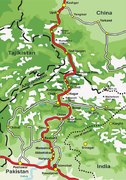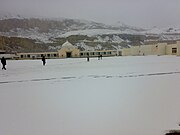| This article needs additional citations for verification. Please help improve this article by adding citations to reliable sources. Unsourced material may be challenged and removed. Find sources: "Sust" – news · newspapers · books · scholar · JSTOR (December 2019) (Learn how and when to remove this message) |
| Sust سوست | |
|---|---|
| Village | |
 The town of Sost The town of Sost | |
    | |
| Coordinates: 36°41′24″N 74°49′16″E / 36.69°N 74.821°E / 36.69; 74.821 | |
| Country | Pakistan |
| Autonomous state | Gilgit-Baltistan |
| Division | Gilgit |
| District | Hunza |
Sust or Sost (Urdu: سوست) is a village located in the Gojal, Upper Hunza in the Gilgit–Baltistan region of Pakistan. Situated at an elevation of 2,800 meters above sea level, Sost is the last Pakistani town on the Karakoram Highway before the Chinese border.
The town plays an important role in the transportation of both passengers and cargo because it serves as the gateway for all traffic crossing the Pakistan-China border. The Pakistani immigration and customs departments are based in Sost, making it a pivotal point for border clearance and administrative procedures. Furthermore, Pakistan and China have opened the border at Khunjerab for trade and tourism.
The Silk Route Dry Port commenced its business operations at the port in Sost, Upper Hunza, near the Khunjerab Pass in Gilgit-Baltistan. The annual trade volume between these two countries has seen a significant increase, rising from less than $2 billion in 2002 to $6.9 billion, with an ambitious target of reaching $15 billion by 2014.
Sost Dry Por is the first formal port at the China-Pakistan border. It serves as a critical hub for customs clearance and other necessary formalities for goods moving from the city of Kashgar and the surrounding Xinjiang autonomous region in China to various commercial centers in Pakistan.
The town of Sost is well-connected by the Karakoram Highway, which links it to several towns and cities in both Pakistan and China. To the south, it connects to Gulmit, Aliabad, Gilgit and Chilas while in the north, it provides access to the Chinese cities of Tashkurgan, Upal and Kashgar, thereby enhancing trade and transportation routes in the region.
The Main languages spoken here are Wakhi and Brushki.
Karakoram Highway
The Sost dry port is connected by the Karakoram Highway to Gulmit, Aliabad, Gilgit and Chilas on the south and to the Chinese cities of Tashkurgan, Upal and Kashgar in the north. The Northern Areas Transport Corporation offers passenger road service between Islamabad, Gilgit and Sost. Passenger road service between Tashkurgan and Sost also exists. Road service between Kashgar and Gilgit (via Tashkurgan and Sost) started in summer 2006. However, the border crossing between China and Pakistan at Khunjerab Pass (the highest border of the world) is open only between April 1 and November 30. Under the protocol agreement signed by Pakistan and Chinese authorities, the border is usually closed on Nov 30 and reopened on April 1 every year.
-
 Overview of the Karakoram Highway
Overview of the Karakoram Highway
-
 Sost according to this sign.
Sost according to this sign.
-
 Sust according to this sign.
Sust according to this sign.
-
 Sost dry port
Sost dry port
-
 Sost dry port loading dock
Sost dry port loading dock
References
External links
This Gilgit-Baltistan location article is a stub. You can help Misplaced Pages by expanding it. |